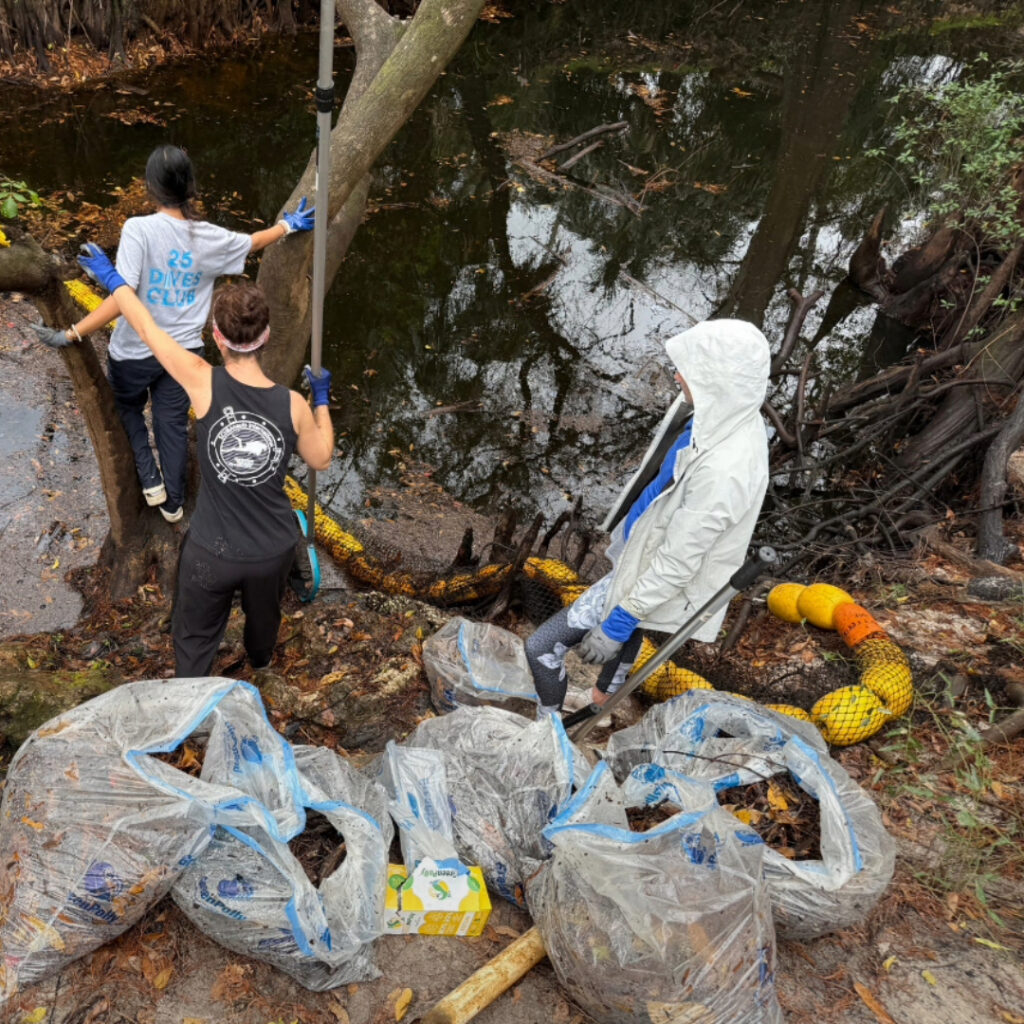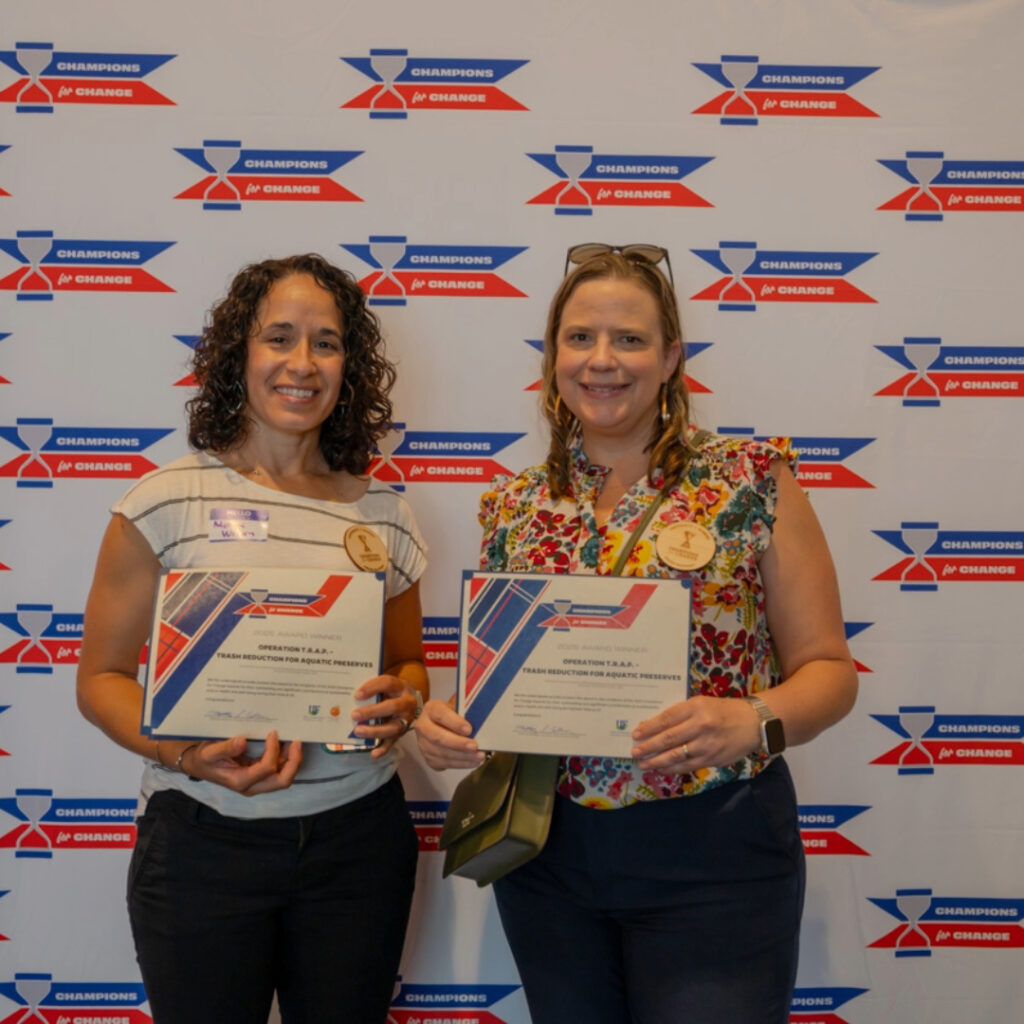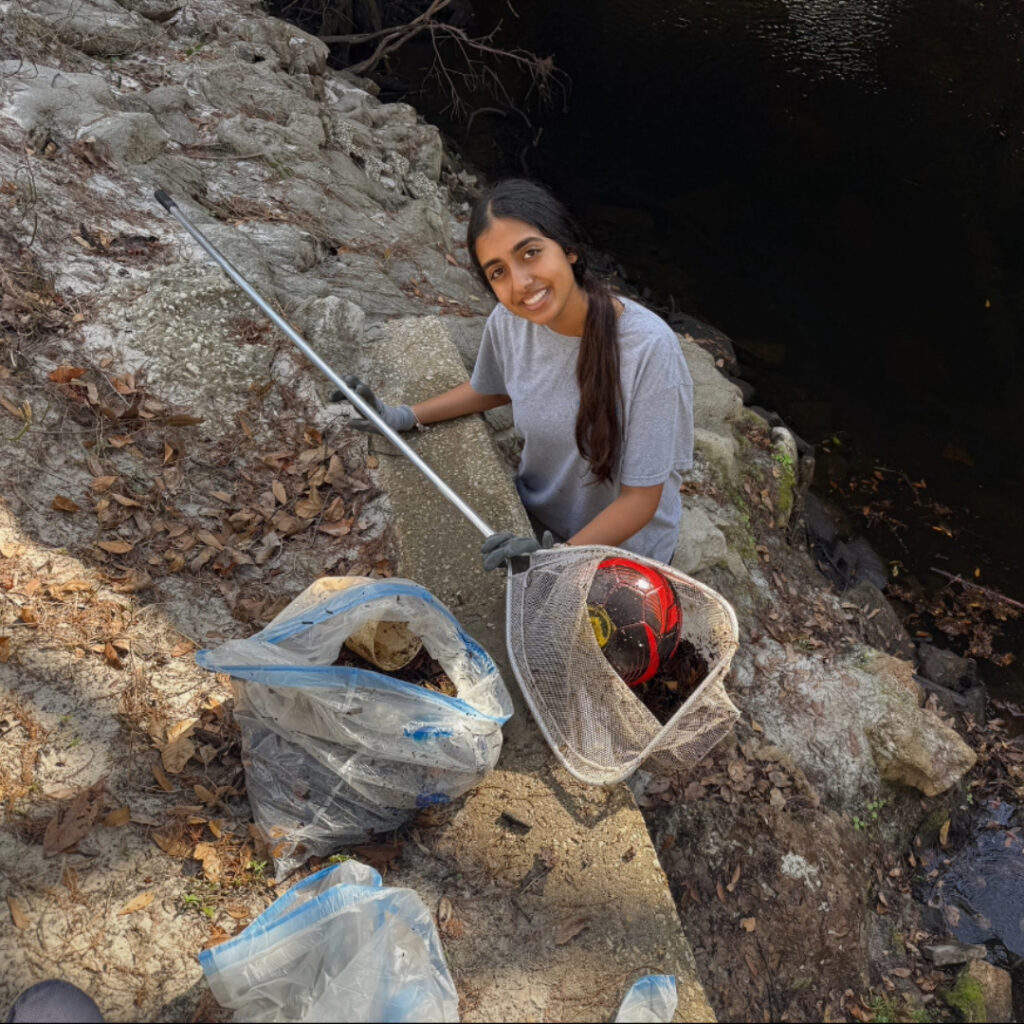
Operation TRAP volunteers cleaning out trash from a local watergoat. Image by Swara Patel.
Every minute, two garbage trucks filled with plastic end up in the ocean. That’s why as a Hillsborough County High School Student, Swara Patel steps into the waist-high waters of the Anclote River to clean up trash before it reaches the coast. Patel is a part of a network of volunteers across Pasco and Levy County in a project known as Operation TRAP (Trash Reduction for Aquatic Preserves).
Operation TRAP is an effort focused on partnering with local governments and Florida Department of Environmental Protection’s (FDEP) Aquatic Preserve systems to intercept litter at the source and reduce the amount of marine debris entering Florida’s coastal waters.
Since 2023, Operation TRAP has made an impressive impact across Cedar Key and Pasco County. The total number of debris interceptor devices installed are:
* 25 storm drain traps. Baskets that sit inside the stormwater drain and prevent trash and other debris carried by stormwater from entering the storm drain system systems.
* 3 watergoats. Floating barriers designed to stretch across the canal and creek waterways to capture floating debris in slow-moving water.
* 15 Monofilament collections. Recycling containers installed at public water access points such as boat ramps and fishing piers.
Together, these efforts have removed 4,959.14 pounds of trash, including 8,573 pieces of large debris captured by storm drain traps.
Recently, outstanding commitment was recognized by the University of Florida Office of Sustainability through the Champions for Change Award. This annual award, a partnership between the Office of Sustainability and Healthy Gators, honors individuals and groups at UF who have made significant contributions to sustainability or health and wellness. Dr. Laura Reynolds and Dr. Monica Wilson accepted the award on behalf of the Operation TRAP team. Operation TRAP also received 2nd place in 2025 ANREP and FANREP Award for Outreach and Promotional Marketing Materials.

Operation TRAP Project coordinator, Dr. Monica Wilson (left), and project co-investigator, Dr. Laura Reynolds (right) at UF Champions of Change award ceremony.
Dr. Wilson, the Operation TRAP project coordinator, was approached about the award by the University of Florida Office of Sustainability Director, during her Nature Coast Currents presentation on Operation TRAP.
“It is so rewarding to get noticed for the work you are doing so early in the project. It really helps put things in perspective when I’m digging through trash,” says Dr. Wilson.
The success of Operation TRAP was evident in the aftermath of the major hurricanes that struck Florida in 2024. Despite widespread flooding and increased debris loads, the project’s stormwater devices and interceptors played a crucial role in managing urban runoff and capturing debris before it entered sensitive waterways and aquatic preserves.
“The storm drain interceptor devices and water goats did wonderfully during the hurricane. We were able to catch unusual heavy debris including desks and tires.” says Dr. Wilson.
This work wouldn’t be possible without volunteers. To date, Operation TRAP has hosted over 237 cleanup events with 102 dedicated volunteers participating.
It is so rewarding to get noticed for the work you are doing so early in the project. It really helps put things in perspective when I'm digging through trash.
Dr. Monica Wilson

Swara Patel, local SCUBAnaut volunteer cleans out watergoat in Anclote River, Pasco County. Image by Swara Patel.
To ensure volunteer safety and effectiveness, Operation TRAP offers a free, 45-minute training that covers site safety, access procedures, and data collection protocols. Volunteers help clean out, organize, and analyze the amount of litter captured by our interceptor devices. Clean up events are used to engage with the community and foster change through data driven education and outreach.
Swara Patel, a returning volunteer and participant in the Adopt-a-Watergoat program through SCUBAnauts, exemplifies the passion driving this initiative. Patel, is a rising junior at Carrollwood Day School in Tampa, Florida, in SCUBAnauts, a marine education program designed for younger individuals and high schoolers.
“Growing up in Tampa and going to beaches like Clearwater Beach and Honeymoon Island, I would notice a lot of pollution. I would see plastic bottles on the beach, and noticed a mass amount of litter in the ocean while scuba diving. Then I would hear stories about animals being washed up on shore, having plastic found inside them. I realized I wanted to do something about it.”
Patel’s monthly commitment to her local watergoat consists of organizing a team of volunteers to clean out any trash captured by the watergoat using nets. Once the garbage is collected, Patel and her team weigh, sort and organize the collected trash. The data is added to the Operation TRAP database that is shared with Water Warrior Alliance, NOAA, and the International Trash Trap Network.
“Devices such as watergoats make it easier for us to access smaller debris and bits of plastic before it gets in our coastal waters, which may become harder to clean up due to currents and waves. Many people do not realize that rivers and waterways are connected to our wider coastal waters,” says Patel. “Being a part of Operation TRAP gives me a sense of accomplishment for helping out the marine community.”
Interested in participating in this award-winning volunteer program?
Volunteer options include:
- Adopt-a-Watergoat – Do you have a group that would like to conduct monthly clean ups? Your group can adopt one of our Watergoats in Pasco County.
- Adopt-a-Tube – We need your help cleaning out and collecting data on the amount of fishing line being recycled.
- Monthly emails – Sign up here to receive our monthly email that list all our volunteer opportunities for the month.
- Calendar of events – See what events are coming up for the rest of 2025 here and sign up to help.
All volunteers will be trained and supplied with the tools necessary to perform the clean ups. If you have any questions, please do not hesitate to email Monica Wilson at [email protected].
This project is supported by the National Oceanic and Atmospheric Administration Marine Debris Program.
The University of Florida (UF), Florida Sea Grant, and UF/IFAS Extension work closely with the Florida Department of Environmental Protection (FDEP) within the regional Aquatic Preserves of the Nature Coast. Funding from FDEP supports UF to carry out monitoring and other programs within the Nature Coast Aquatic Preserve (NCAP) under the guidance of Regional Manager Tim Jones and the regional FDEP management team. NCAP is managed by FDEP’s Office of Resilience and Coastal Protection. The views, statements, findings, conclusions and recommendations expressed herein are those of the author and do not necessarily reflect the views of the State of Florida or any of their sub-agencies. Learn more about Aquatic Preserves at https://floridadep.gov/rcp/aquatic-preserve.